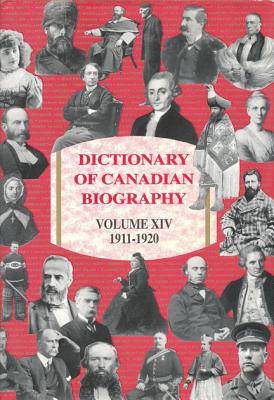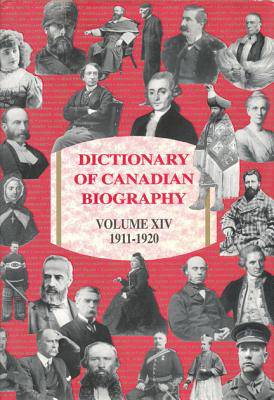
- Retrait gratuit dans votre magasin Club
- 7.000.000 titres dans notre catalogue
- Payer en toute sécurité
- Toujours un magasin près de chez vous
- Retrait gratuit dans votre magasin Club
- 7.000.000 titres dans notre catalogue
- Payer en toute sécurité
- Toujours un magasin près de chez vous
Dictionary of Canadian Biography / Dictionaire Biographique Du Canada
Volume XIV, 1911-1920
Description
Decked out with a new dust-jacket, this volume continues the literary and scholarly standards that have made the DCB/DBC the definitive biographical reference work in Canadian history. The product of more than 450 authors, XIV documents, in highly readable fashion, the lives of 622 individuals who died between 1911 and 1920. The spectrum is engagingly broad: from Klondike dance-hall keeper to peanut vendor to poltergeist victim.
The volume effectively brings to a close the 19th century in Canada. Increasingly, 20th-century realities pervade the biographies: the development of the west, the growth of business and finance, labour organization, mass immigration and big cities, progress in education, literature, and the arts, and the cataclysm of world war.
The search for a Canadian identity is a dominant theme of the era chronicled here. In a key biography, Sir Wilfrid Laurier is superbly and critically portrayed as a builder of modern Canada. James P. Whitney's innovative legislation shaped modern Ontario. In international affairs George Gibbons negotiated a fundamental treaty in Canadian-American relations; in the far north mounted policeman Francis Fitzgerald asserted Canadian sovereignty, only to perish in the Lost Patrol. As minister of defence, Sir F. W. Borden aimed for more autonomy within the imperial defence system.
The volume responds with fairness and insight to the enormous challenge of selection presented by the deaths of thousands of Canadians in the Great War. Divisional commander Louis Lipsett died in the field, as did Rankin Wheary, a black private from New Brunswick. John McCrae's famous poem made the poppy a cherished symbol. At the same time, there were objectors, internees, and outspoken figures in the clash of nationalist currents over Canada's role within the empire.
Canadian identity emerges no less in the arts. Louis Hémon's writings made Quebec known throughout the French-speaking world. The work of Mohawk poet E. Pauline Johnson was infused with both idealism and nationalism. Tom Thomson's northern painting inspired the Group of Seven, and Haida artists continue to be influenced by the carvings of Charles Edenshaw.
Spécifications
Parties prenantes
- Editeur:
Contenu
- Nombre de pages :
- 1100
- Langue:
- Anglais
- Collection :
- Tome:
- n° 14
Caractéristiques
- EAN:
- 9780802034762
- Date de parution :
- 01-06-98
- Format:
- Livre relié
- Format numérique:
- Genaaid
- Dimensions :
- 187 mm x 263 mm
- Poids :
- 2254 g






